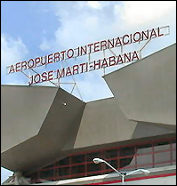 A United Flight from Dulles Airport in Washington, DC, on its way to Cancun, Mexico, over the weekend was diverted for an emergency landing after the crew became concerned about an odd odor on the flight. The closest airport at the time of the diversion was the Jose Marti airport in Cuba
A United Flight from Dulles Airport in Washington, DC, on its way to Cancun, Mexico, over the weekend was diverted for an emergency landing after the crew became concerned about an odd odor on the flight. The closest airport at the time of the diversion was the Jose Marti airport in Cuba
Readers of this blog might recall an earlier post where a fishing boat wandered into Cuban territorial waters and got whacked by BIS with a fine for the illegal export (albeit temporary) of the boat to Cuba. Is United going to get a nastygram for BIS over this emergency landing in Cuba?
This is where license exception AVS, which is set forth in section 7540.15 of the Export Administration Regulations, comes in. That exception gives certain aircraft special exemptions from certain export requirements.
Section 740.15(a)(2)(i) deals with U.S. registered aircraft operating under an Air Carrier Operating Certificate, Commercial Operating Certificate, or Air Taxi Operating Certificate issued by the Federal Aviation Administration. This section would cover the United flight. All remaining U.S. registered aircraft are covered under Section 740.15(a)(2)(ii). Under the first of these exceptions, no license is required for the “export” of the aircraft from the United States when it flies to foreign countries, as long as certain conditions are met that qualify it as a temporary sojourn. Under the second category for all other U.S. registered aircraft, there is an explicit provision prohibiting the use of the exception for flights to Cuba. So although a United pilot could divert his aircraft to Cuba under this exception, Joe Pilot in a private plane could not make an emergency landing at Jose Marti in Cuba no matter what he smelled in the aircraft. Section 740.15(a)(5) says that the exception can’t be used for exports or re-exports to Cuba or other Group E countries, but I am assuming that this is just an inartful way of repeating that trips to Cuba must be temporary sojourns meeting the other requirements of section 740.15.
Even if the emergency landing in Cuba did not violate BIS’s rules, United’s headaches may not be over. The Cuba sanctions regulations of the Office of Foreign Assets Control (“OFAC”) prohibit “the receipt of goods or services in Cuba, even if provided free-of-charge by the Government of Cuba or a national of Cuba.” It seems hard, if not impossible, to land in Cuba without receiving services, even if just the clearance to land, from Jose Marti airport. And I don’t see an exception in the OFAC regulations for an emergency landing. I’m sure Ileana Ros-Lehtinen, Bob Menendez and the other Cuba hawks on the Hill are having major conniption fits over this and dashing off letters to OFAC calling for the death penalty for everyone involved in this unplanned trip to Cuba.

 Posted by
Posted by  Category:
Category: 



